Last updated on October 10th, 2023 at 04:30 am
How to Start a Blog in Nigeria and Make Money Easily
You might be wondering, “Can I really make money easily through blogging?” The answer is a resounding yes! However, as with any endeavor, success in blogging isn’t merely about hitting the ground running and watching the cash flow. It’s about strategy, dedication, and a deep understanding of what makes the blogosphere in Nigeria unique.
Getting Started with Blogging
So, you’ve decided to kickstart your blogging journey in Nigeria – a journey that can lead you to financial independence and creative fulfillment. But before you can dive headfirst into the exciting world of blogging, you need to lay the foundation for your online presence. This involves choosing the right domain name, securing reliable web hosting, and setting up your blog using the powerful WordPress platform.
Wait a minute…
Just like with the business of building a house, you first of all need to start by working on its foundation and make it super solid before you begin to lay the stones. Isn’t that so?
I’m going to do well to walk you through the step-by-step process of building a successful blog in Nigeria, one that will help you make money online and position you as an authority in your niche.
I beg to submit to you that riches are niches. To succeed in the business of blogging in Nigeria, you need to, first of all, discover and fill a niche. Yes, you’ve got to be the go-to expert in the topic you talk about to make serious money online like some of your online mentors.
The key to a successful blog is not only choosing the right niche but also delivering valuable and engaging content consistently. Share on XThe Power of Niche Selection
Your blog’s niche is the compass that will steer you toward success. Think of it as your blog’s unique fingerprint; it sets you apart and defines your identity in the blogosphere. Choosing the right niche is akin to laying a strong foundation for a skyscraper; it supports everything you build upon it.
Why is a Well-Chosen Niche Important?
A well-chosen niche has several key benefits:
- Audience Targeting: It helps you reach the right audience interested in your content, increasing engagement and conversion rates.
- Content Focus: It guides your content creation, ensuring that every post aligns with your blog’s core theme.
- Authority Building: Specializing in a niche allows you to become an expert in that area, earning credibility and trust from your readers.
- Monetization Opportunities: Many profitable blogs in Nigeria are niche-specific, as advertisers and affiliate marketers are eager to collaborate with targeted platforms.
Conducting Effective Niche Research
Before you leap into any niche, it’s crucial to conduct thorough research to ensure you’re making an informed decision. Here’s a step-by-step guide to conducting niche research:
- Identify Your Passions and Interests: Start by listing your passions, hobbies, and interests. Blogging about something you genuinely care about will keep you motivated in the long run.
- Explore Existing Blogs: Look for blogs in your areas of interest. Study their content, audience engagement, and monetization strategies. This research will give you valuable insights into your chosen niche.
- Keyword Research: Utilize keyword research tools to discover popular search terms and trends within your niche. This will help you identify potential topics to cover and assess the competition.
- Check Profitability: Consider the potential for monetization within your chosen niche. Explore how other bloggers are earning income, whether through ads, sponsored posts, affiliate marketing, or digital products.
- Validate Demand: Ensure there’s a demand for your chosen niche in Nigeria. Look for forums, social media groups, and online communities where people discuss topics related to your niche.
Profitable Blog Niches in Nigeria
Now, let’s explore some profitable blog niches that have been thriving in Nigeria. Keep in mind that these niches are just examples, and your niche should align with your interests and research findings. Here are a few promising niches:
- Health and Wellness: With the increasing focus on health and fitness, blogs covering topics like nutrition, exercise, mental health, and natural remedies have a wide audience.
- Personal Finance: Nigerians are actively seeking financial advice and investment opportunities. Blogs that offer insights on budgeting, saving, and investing can be highly lucrative. No wonder Adsense Arbitrage bloggers thrive so well in this niche.
- Technology and Gadgets: As technology advances, tech-related blogs remain popular. Cover topics like smartphone reviews, tech news, and how-to guides.
- Fashion and Beauty: Nigeria’s fashion industry is booming. Share fashion tips, beauty hacks, and style inspiration to engage with a fashion-conscious audience.
- Food and Recipes: Nigerians love good food. A blog that explores local and international cuisines, recipes, and cooking techniques can attract food enthusiasts.
- Entertainment and Celebrity News: Nigerians are passionate about entertainment. Cover celebrity news, movie reviews, and trending entertainment stories.
Remember, the key to a successful blog is not only choosing the right niche but also delivering valuable and engaging content consistently.
Blogging is not a hobby but a business. You must see it as a business that requires investments. Share on XChoosing a Domain Name: Your Digital Identity
Your domain name is the digital identity of your blog. It’s what your readers will type into their web browsers to access your content. Selecting the perfect domain name is crucial because it represents your brand and sets the tone for your blog.
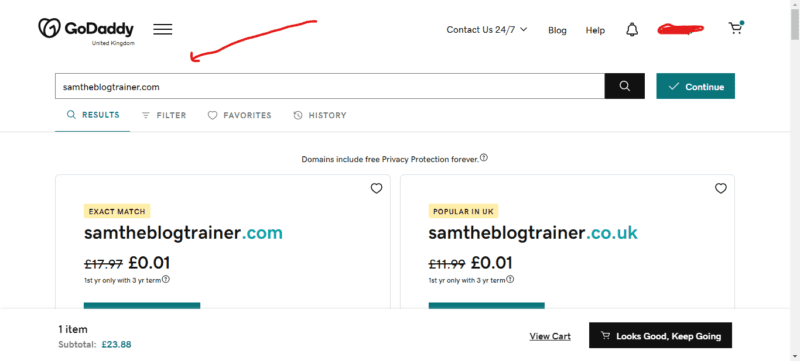
This image shows that this “top-level domain” is available.
Process of Selecting a Domain Name
- Brainstorm Ideas: Start by brainstorming domain name ideas that resonate with your blog’s niche or focus. Consider keywords related to your chosen topic and keep it short and memorable.
- Check Availability: Once you’ve narrowed down your options, use a domain registrar like Namecheap or GoDaddy to check if your desired domain name is available. If it’s already taken, explore variations or consider using a different domain extension like .net or .co.
- Avoid Hyphens and Numbers: While it might be tempting to use hyphens or numbers to secure your preferred domain, it’s best to stick with an easily readable and rememberable name without special characters.
- Trademark Check: Ensure that your chosen domain name doesn’t infringe on any trademarks or copyrights. This step is essential to avoid legal issues down the road.
The Importance of Reliable Web Hosting Service
Now that you have your domain name, it’s time to choose a reliable web hosting provider. Web hosting is like the foundation of your blogging house. It’s where all your blog’s files and content will be stored, and it plays a crucial role in your site’s speed, security, and overall performance.
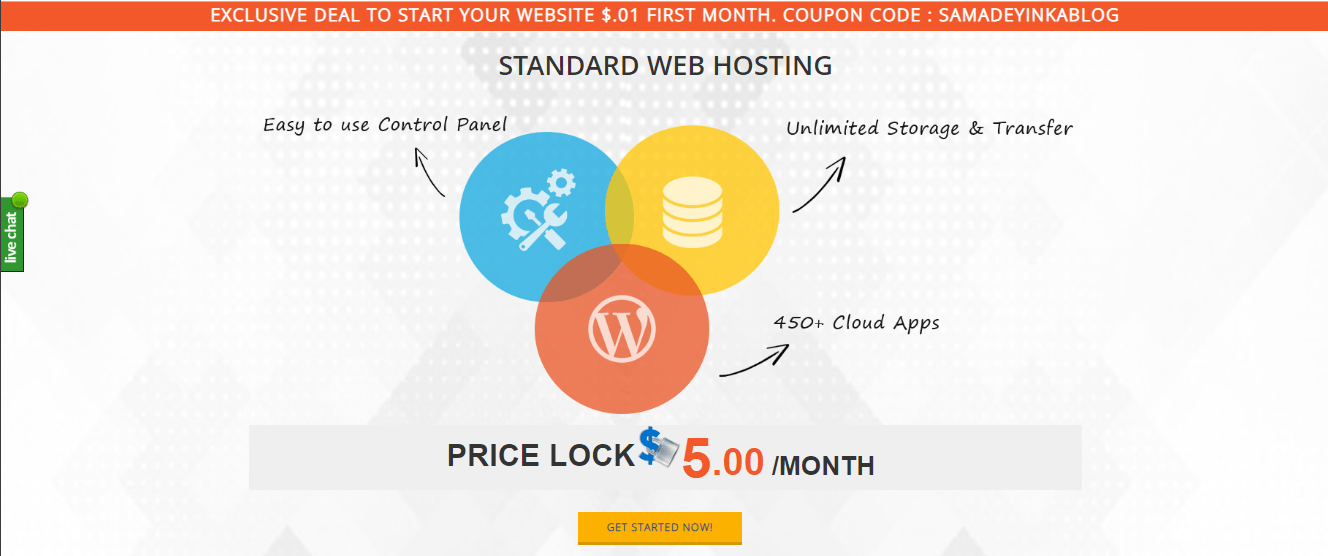
Selecting a Web Hosting Provider
- Evaluate Hosting Plans: Research different hosting providers and compare their plans. Consider factors like server uptime, customer support, scalability, and pricing.
- Read User Reviews: Look for user reviews and testimonials to gauge the experiences of other bloggers with the hosting provider. This can provide valuable insights into the quality of their service.
- Choose a Plan: Depending on your needs and budget, select a hosting plan that aligns with your blogging goals. Shared hosting is a cost-effective option for beginners, while VPS or dedicated hosting offers more resources for larger websites.
- Install WordPress: Most hosting providers offer one-click WordPress installations. Take advantage of this feature to set up your blog quickly and efficiently.
Pro Tip: As a newbie blogger, make sure to fly on the wings of web hosting services that offer reliable customer support like InterServer. Speaking about InterServer, I have never experienced a major downtime with them like I did with SmartWeb back in the day. That’s a story I will share with you in another blog post.
Setting Up Your Blog with WordPress
WordPress is the go-to content management system for bloggers worldwide and for a good reason. It’s user-friendly, highly customizable, and equipped with a vast library of plugins and themes. In this blog post, I shared why I love and use WordPress for all of my web design projects.
Step-by-Step WordPress Setup
- Access Your Hosting Control Panel: Log in to your hosting control panel (usually cPanel) and locate the “WordPress” or “Softaculous” installer.
- Choose Domain: Select the domain where you want to install WordPress and create a directory if needed.
- Configure Settings: Enter your blog’s title, description, and administrative login details. Make sure to use a strong and secure password.
- Install WordPress: Click the “Install” button, and the installer will set up WordPress for you. Once completed, you’ll receive login credentials for your WordPress dashboard.
- Customize Your Blog: Access your WordPress dashboard and begin customizing your blog’s appearance by selecting a theme and installing essential plugins.
By following these steps, you’ll have your blog’s foundation in place, complete with a unique domain name, reliable hosting, and a user-friendly content management system. Now, you’re ready to move forward on your blogging journey in Nigeria.
Designing Your Blog: Your Blog’s Visual Identity
The minute you kickstart your journey to becoming a professional blogger, one of the first impressions you’ll make on your readers is through the design of your blog. Think of it as the digital storefront of your brand; it’s got to be inviting, user-friendly, and visually appealing. After all, you wouldn’t want to visit a store with a cluttered and confusing layout, would you?
The Significance of a User-Friendly Design
User-friendliness is key. Your readers should easily navigate your blog without feeling like they’ve entered a labyrinth. When visitors arrive at your blog, they should be able to find what they’re looking for swiftly. This means clear menus, intuitive navigation, and a layout that doesn’t overwhelm.
Now, let’s talk about the elephant in the room: aesthetics. Your blog’s visual appeal matters more than you might think. Studies have shown that users tend to trust and stay longer on sites that look professional and visually pleasing. So, a well-thought-out design isn’t just about appearances; it’s also about building trust and credibility with your audience.
Choosing the Perfect WordPress Theme
WordPress is the go-to platform for bloggers, and one of its standout features is the vast selection of themes available. Your theme is like the canvas on which you paint your blog’s visual identity. When choosing a theme, keep the following factors in mind:
- Simplicity: Go for a theme that aligns with your content and doesn’t distract from it. Avoid overly complex designs that might overwhelm your readers.
- Responsiveness: In today’s mobile-centric world, your blog must be mobile-responsive. This means it adapts seamlessly to various screen sizes, ensuring a great user experience for everyone, whether they’re on a laptop, tablet, or smartphone.
- Customizability: Look for themes that offer customization options. You’ll want to add your unique touch to your blog, whether it’s through colors, fonts, or layout.
- Speed: Opt for a theme that’s optimized for speed. Slow-loading sites can frustrate readers and affect your search engine rankings.
Pro Tip: Astra, Kadence, SociallyViral, and Avada are themes that consistently tick all of the above pointers. You might want to try any of these ones out, especially Astra or SociallyViral if you’d love to stick with a simple and fast-loading website that is also compatible with Google Adsense.
The Importance of Mobile Responsiveness
Mobile devices have become the primary means of internet access for many people. If your blog isn’t mobile-responsive, you risk alienating a significant portion of your potential audience. Google also prioritizes mobile-friendly websites in its search results, so mobile responsiveness isn’t just about user experience; it’s also about SEO.
Incorporating these elements into your blog’s design sets the stage for a positive user experience. Remember, your blog’s design is your first impression, so make it count. Now, as you begin the process of designing your blog, keep these principles in mind, and you’ll be well on your way to creating a visually stunning and user-friendly weblog.
Remember, we’re building the foundation of a successful blog, so take your time with the design phase. Your blog’s visual identity is your digital fingerprint, and it’s worth the investment.
Note: If you’ve got questions or need further guidance on creating your own blog from scratch, please feel free to reach out, and I’ll be here to assist you every step of the way.
Installing Essential Plugins: Discover the Must-Have Plugins
In the world of blogging, plugins are like the handy tools in your toolkit that make your job easier. These little pieces of software can significantly enhance your blog’s functionality and user experience. In this phase, we’ll explore some essential plugins that every Nigerian blogger should consider installing on their WordPress site.
- Yoast SEO: SEO is the heartbeat of a successful blog. Yoast SEO is a powerful plugin that helps you optimize your content for search engines, ensuring your blog posts reach a wider audience. Personally, I make use of RankMath for my blogs. It does the same job as Yoast SEO, but better.
- Akismet Anti-Spam: Spam comments can be a nuisance. Akismet is your trusty sidekick that filters out spam and keeps your blog’s comment section clean and engaging.
- W3 Total Cache: Speed matters in the digital world. W3 Total Cache improves your blog’s loading speed, delivering a seamless experience to your readers.
- UpdraftPlus: Backup is your blog’s safety net. UpdraftPlus allows you to effortlessly schedule backups, ensuring that your valuable content is never lost.
- Wordfence Security: Protecting your blog from potential threats is essential. Wordfence Security adds an extra layer of security, safeguarding your blog from hackers and malware.
Installing these essential plugins is a simple process. Navigate to your WordPress dashboard, go to the “Plugins” section, click “Add New,” and then search for the plugin names. Once you find them, click “Install” and then “Activate.” It’s that easy!
Creating Important Pages: From Your About Page to Your Contact Page
Your blog is like a virtual home, and just like any home, it should have some essential rooms. These rooms are the pages that provide valuable information to your readers and establish your blog’s credibility. Here are the crucial pages that every Nigerian blogger should include:
- About Page: Your readers want to know who you are. Use your About page to introduce yourself, share your journey, and let your personality shine. Building a personal connection with your audience starts here.
- Contact Page: Accessibility is key. Create a Contact page where readers, brands, or potential collaborators can reach out to you. Include a contact form or your email address to make it easy for people to connect.
- Privacy Policy: In today’s digital landscape, privacy is paramount. A privacy policy page outlines how you collect, use, and protect user data on your blog, instilling trust in your audience.
- Terms of Use/Service: If you offer services, or products, or have specific guidelines for using your blog, a terms of use or service page is essential. It sets clear expectations for your readers.
- Disclaimer: Transparency is crucial. Use a disclaimer page to disclose any potential conflicts of interest, sponsored content, or affiliate links on your blog.
- Sitemap: A sitemap page helps both readers and search engines navigate your blog effectively. It provides an organized list of all your blog’s pages and posts.
Creating these pages is as straightforward as creating a new blog post. Simply go to your WordPress dashboard, click “Pages,” and then “Add New.” Customize each page with relevant content, and don’t forget to add them to your blog’s navigation menu for easy access.
By including these essential pages, you’re not only providing valuable information to your readers but also establishing trust and professionalism in the Nigerian blogging sphere.
Pro Tip: Having these essential pages (with substantial content on them) will make Google Adsense approve your application fast, especially if you’ve got at least 20-35 quality published posts.
Recommended: The Best Blogging Platforms to Make Money in 2023
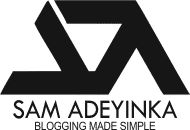


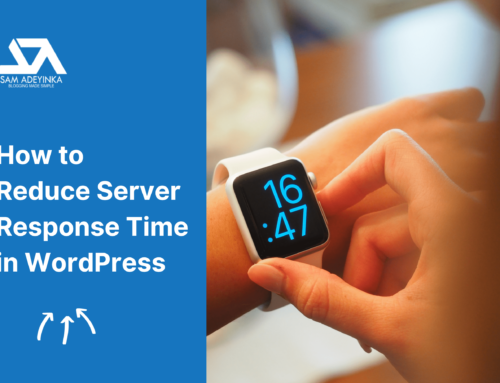
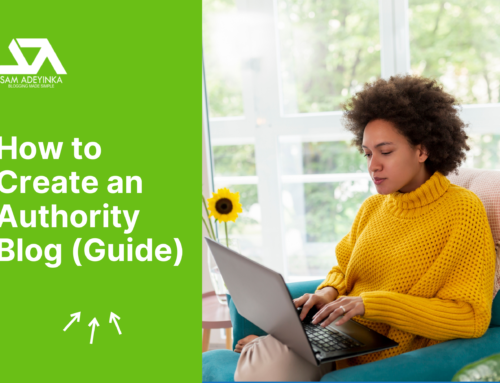







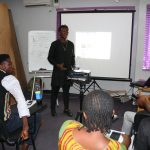





Thank God am here
Am starting to enjoy this blog.
Awesome to hear that, Favour!
How are you doing these days?
Been a while I see you around here.
Sam Adeyinka recently posted…How to Create an Authority Blog (Step-by-Step Guide)
Hey Sam! 😊
Wow! This post is fully packed with some seriously helpful tips on starting a blog in Nigeria and making money from it. Your step-by-step guide makes the whole process seem so much more manageable!
I love how you emphasized the importance of choosing the right niche. It’s something I struggled with when I started my own blog, and your insights have given me a fresh perspective. Do you have any suggestions for brainstorming niche ideas?
Looking forward to more fantastic content from you! Keep up the great work. 👍
Cheers,
Seun
How did I miss this wonderful comment?!
Well, I’ve been on and off blogging for the past 3yrs… I’m back now though.
I’m super sure you must have gotten around the question you asked…. if not, I will share a tip or two: personally, I feel finding a niche is the same as finding your purpose. You just have to know what makes you tick; what you’re passionate about.. and you’re good to go.
I would write down all the things I’m passionate and interested in… things that make me super excited… I would make sure that they can easily be monetized, then will go out and try to validate the idea.
That’s it.
Sam
Sam Adeyinka recently posted…How to Create an Authority Blog (Step-by-Step Guide)
Thank you for sharing these valuable insights! Starting a blog in Nigeria can seem daunting, but your article breaks it down into manageable steps. I appreciate the guidance.
I truly heartpreciate your heads up, Olatubosun! Let’s keep thriving! 🚀
Sam Adeyinka recently posted…How to Create an Authority Blog (Step-by-Step Guide)
[…] Start a Blog […]
[…] Start a Blog […]
Hey there!
I just stumbled upon your blog, and I have to say, it’s been a fantastic journey reading through your guide on starting a blog in Nigeria and making money from it. Your enthusiasm is contagious, and your step-by-step approach makes it seem so achievable!
I’ve been contemplating starting my own blog for a while now, and your post has given me that extra push I needed. Your tips on choosing a niche and monetization strategies were spot on. I can’t wait to put them into action.
Thanks a million for sharing your knowledge and experiences with us. Keep up the awesome work, and I’ll be sure to follow your blog for more incredible insights and inspiration.
Cheers to the blogging adventure ahead!
Oh, namesake! I’m super grateful for your kind words man.
I’m glad you found value in this blog post. I would truly appreciate if you could spare some time to help share it with your network.
Thank you, my friend!
Sam Adeyinka recently posted…Unlocking $6000: A Blueprint for Successful Blogging Earnings in Nigeria
Hey there! Adio Michael here, and I just wanted to say how much I enjoyed reading your post! Your step-by-step guide on starting a blog in Nigeria is not only super informative, but it’s also presented in such an engaging way. I’m feeling inspired and ready to dive into the world of blogging myself!
Keep up the awesome work, and thanks for sharing your expertise! Looking forward to more fantastic content from you. Cheers to blogging success!
Best regards,
Michael
Hey, Michael! 👋🏾
I’m glad you found the blog post engaging and valuable. I hope to keep seeing you on the blog.
Let’s grow together!
Thanks, fam.
Sam
Sam Adeyinka recently posted…Free WordPress Installation Service – Create Your Own Website Today!
Wow, what an amazing guide! This article is a goldmine for anyone looking to kickstart their blogging journey in Nigeria. Your step-by-step approach is incredibly helpful, and I’m truly inspired by your success story.
I can’t thank you enough for sharing your valuable insights and practical tips. Your dedication to helping others achieve their blogging dreams is truly commendable.
I’ve already started implementing some of your suggestions, and I’m feeling more confident about my blogging venture. Keep up the fantastic work, and please continue to share your expertise with us!
Wishing you continued success and looking forward to more fantastic content from you.
I love fast action-takers! You are doing well, Mercy… I can’t wait to read your testimony. By the way, if you do have questions or doubts, do not hesitate to reach out to me, I’d be willing to oblige.
Sam Adeyinka recently posted…SEO Friendly Content: 5 Creative Ways to Increase Website Traffic
Thank you for sharing these valuable tips on starting a blog in Nigeria. I appreciate the step-by-step guidance you’ve provided. I’m curious to know more about content strategy for attracting a local audience. Can you delve deeper into that in your next post?
Hello, Blessing! 👋🏾
I’m glad you found this post valuable. Thanks for stopping by to read and share the blog. I appreciate you!
And thanks for suggesting that blog post topic, I will try my best to research and develop content on it… however, I already covered a topic around social media management and I briefly touched on content strategy, you might want to check that out via the link below.
Sam
Sam Adeyinka recently posted…How to Become a Social Media Manager in Nigeria
Amazing the website. Over time, your blog can become a go-to resource for anyone seeking information or inspiration in your chosen field.
Thank you, Nasir! 🙏🏾🚀
“Incredibly insightful guide! Your step-by-step instructions on starting a blog in Nigeria are invaluable. The money-making tips are a game-changer. Thank you for sharing this wealth of knowledge!”